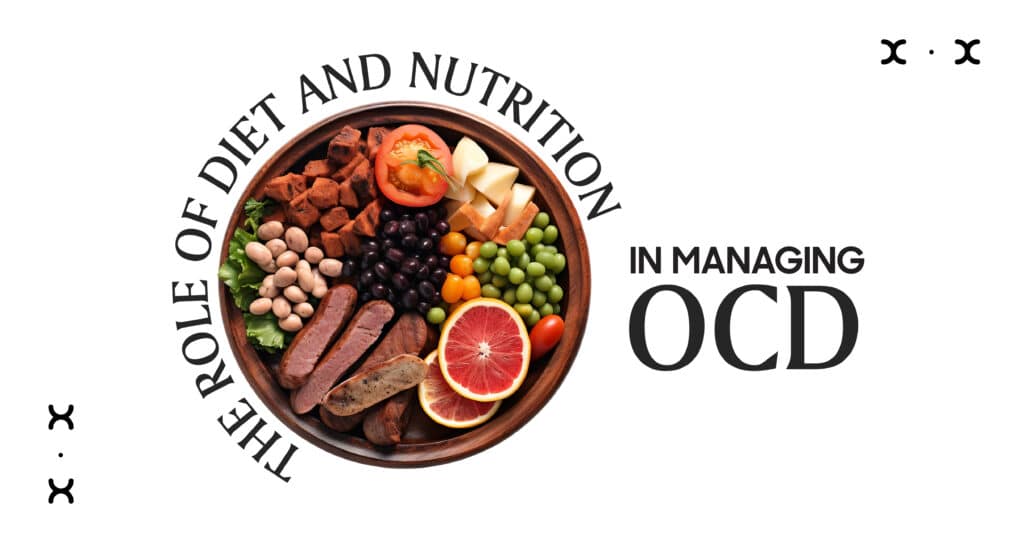Introduction
Living with Obsessive-Compulsive Disorder can be difficult, affecting both daily life and mental well-being. But did you know that your diet and nutrition might play a significant role in managing OCD symptoms? Let’s dive into how certain foods and nutrients can help in the fight against OCD and what dietary changes could make a difference.
Understanding OCD and Its Triggers
What is OCD?
Obsessive-Compulsive Disorder (OCD) is a mental health condition characterized by intrusive thoughts (obsessions) and repetitive behaviors (compulsions). These actions are frequently carried out to relieve the distress triggered by obsessions, forming a cycle that can be challenging to break.
Common Triggers and Symptoms
OCD can be triggered by several factors, including stress, environmental changes, and even diet. Symptoms vary but commonly include:
- Excessive cleaning or handwashing
- Repeatedly checking things (like locks or switches)
- Counting or arranging items in a specific way
- Unwanted thoughts of harm or taboo subjects
The Connection Between Diet and OCD
How Food Impacts Mental Health
There’s growing evidence that what we eat significantly impacts our mental health. Our brains require specific nutrients to function optimally, and deficiencies in these nutrients can exacerbate symptoms of mental health disorders, including OCD.
Critical Nutrients for Managing OCD
Several nutrients are vital when it comes to managing OCD:
- Omega-3 Fatty Acids: These fats in fish, flaxseeds, and walnuts are crucial for brain health.
- Vitamin B12 and Folate: Essential for cognitive function, these vitamins are found in meat, dairy, and leafy greens.
- Vitamin D: It is known as “sunshine vitamin” is vital for mood regulation and can be found in fortified foods and through sunlight exposure.
- Magnesium: This mineral helps regulate neurotransmitters and can be found in nuts, seeds, and green leafy vegetables.
Dietary Strategies for Managing OCD
Incorporating Omega-3 Fatty Acids
Omega-3 fatty acids are essential for brain health and can help reduce inflammation, often linked to mental health disorders.
- Eat fatty fish like salmon, sardines and mackerel, at least twice weekly.
- Add flaxseeds or chia seeds to smoothies, yogurt, or oatmeal.
- Snack on walnuts, which are also a great source of omega-3s.
Boosting Vitamin D Levels
Vitamin D plays an important role in mood regulation and overall brain health.
- Spend time outdoors to get natural sunlight.
- Include fortified foods like milk, orange juice, and cereals.
- Consider a vitamin D supplement, especially in winter or a region with limited sunlight.
Maintaining Balanced Blood Sugar Levels
Blood sugar imbalances can exacerbate OCD symptoms. To maintain stable blood sugar:
- Avoid high-sugar and processed foods.
- Eat regular, balanced meals with a good mix of protein, fats, and complex carbohydrates.
- Snack on nuts, seeds, and fresh fruit to keep energy levels steady.
Foods to Avoid
Certain foods can trigger or worsen OCD symptoms and should be limited or avoided.
Caffeine
While a cup of coffee might seem harmless, caffeine can increase anxiety and exacerbate OCD symptoms.
- Limit coffee, tea, and soda intake.
- Opt for decaffeinated versions or herbal teas.
Sugar and Artificial Sweeteners
High sugar intake can lead to high blood glucose levels, affecting mood and anxiety levels.
– Cut down on sugary snacks, desserts, and sodas.
– Be wary of artificial sweeteners, which can also impact mental health.
Lifestyle Changes to Complement Your Diet
Regular Exercise
Exercise boosts endorphins that can help improve mood and reduce anxiety.
- Aim for at least 30 minutes of exercise most days of the week.
- Choose activities you enjoy, like walking, swimming, or yoga.
Adequate Sleep
Poor sleep can worsen OCD symptoms, so prioritize good sleep hygiene.
- Keep a regular sleep schedule.
- Create a calming bedtime routine and environment.
Mindfulness and Stress Management
Activities such as meditation, yoga, and deep breathing can assist in stress management and alleviate symptoms associated with OCD.
- Set aside time each day for mindfulness practices.
- Use apps or guided meditations to help you get started.
FAQs
Can diet alone cure OCD?
Diet alone is not a cure for OCD, but it can play a significant role in managing symptoms and improving overall mental health.
How quickly will dietary changes affect my OCD symptoms?
The impact of dietary changes can vary, but many people report improvements in a few weeks to a few months.
Are there specific foods that trigger OCD?
Caffeine and high-sugar foods are commonly reported to worsen OCD symptoms.
Should I take supplements for OCD?
Before beginning any supplements, please consult a healthcare provider to make sure they are safe and suitable for your needs.
Wrapping Up
Diet and nutrition play a vital role in managing OCD. Incorporating the proper nutrients and avoiding trigger foods can help alleviate some of the symptoms of this challenging condition. Remember, while dietary changes can make a significant difference, they should complement other treatments and therapies prescribed by healthcare professionals.





